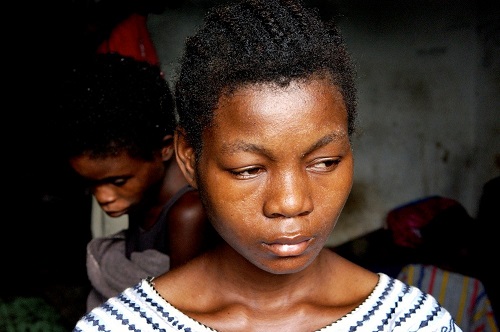Eric Kanalstein/UN photo
By
Deleteh Bank
The sound of shuffling feet makes her entrance known as dozens of predominantly teenage students rise from their seats to say a chorus, “Good morning Auntie”. Preye Jack, a teacher in the Staff School, wordlessly assesses the students as they stand respectfully to attention, five to a bench, and says, “Sit down”. They all sit at the same time.
While they are busy fetching their Social Studies exercise books, Mrs. Jack writes “Human and Environmental Rights” on the black board. She is wont to asking questions surrounding any topic she was going to teach so they immediately start to confer amongst themselves sorting for popular opinions on the subject matter written in chalk.
Biaka is one of the bespectacled bright girls in J.S.S 3 class so she is not mortified that the teacher asks her opinion on the topic of the day.
“Biaka Abebe,” Mrs Jack had called out, “what do you understand by Human and Environmental Rights?”
Biaka was born and bred [that is, until few years ago when her father was offered a lecturing job at the city] in an underdeveloped oil producing community in the district interspersed with streams and rivulets that has been polluted by multinational conglomerates – altered by a seemingly permanent black dent from perennial gas flaring, even the sky hovering over it is a shadow of what was once blue. It is not strange, therefore, that the talk of human and environmental rights has always dominated the adult discussion at her home.
Unfazed, she stands up and explains that this is “the basic rights that everybody- and their environment- has to be treated fairly and not in a cruel way, especially by their government.” She hardly finishes when the teacher interjects loudly with a “clap for her” order.
By the time the lecture is done, Biaka will appreciate more about the topic and even understand that her people are entitled to royalties and mining rents on oil drilled. She is moved.
Knit, knit, and pull. Knit and pull . . . goes her mother’s hand while plaiting her hair. Ah, the pangs! There is nothing more fearful to Biaka than having her hair plaited every month. It is a typical Friday evening: children are screaming and running around by the side of the road, the young people playing Whot and Ludo and protesting about who cheated in the last round, people are passing to and fro and paying a “Good evening, ma” obeisance to Biaka’s mother. Biaka is sitting there on a kitchen chair staring out at her friends, wishing she could play too, and being in a temper at how unfair it is that she is trapped with such hair.
A taxi pulls up to the front of the house. Mr. Abebe climbs down. He is holding a briefcase. By now, Biaka’s mother releases her hair. He proceeds towards them then stands by his wife.
“Papa,” Biaka greets.
“Biaka,” he replies.
“How are you?”
“I am fine.”
He opens his bag and gives Biaka a pack of Cabin Biscuits. Although she had once enjoyed this luxury on a daily, she receives it with so much gratefulness.
It is a brilliant Saturday morning. Chores are done and over with. Biaka is at the sitting room reading In the Shadow of a Saint by Ken Jr. It is one of the books in Papa’s collections. An annotation reads, “A son’s journey to understand his father’s legacies”. Apparently, the writer’s dad was executed by state authority for committing the treasonable felony of standing up for an oppressed minority. This she figures out while flipping through the pages.
She is still busy with the book when Dr Biira, a family friend, comes in. She informs her father of his presence and takes her reading to the dining table.
After the ritual salutations between Mr. Abebe and Dr Biira, they recline at the sitting room. Beers always seem essential to wash down the political discussions whenever Dr Biira comes around. And so, it is not surprising that he has a distended abdomen that appears to strain at his clothing. Dr. Biira is one of several Polytechnic colleagues from the village that Mr. Abebe plays host to at least once every month on such nights filled with loud talks, laughter, fresh palm wine and beers.
Freedom Forum is a political movement that clamours for good representation and emancipation for the people of their community and the environment. It was born from one of such evenings. Mr Abebe is a stakeholder in the Forum.
“Did you hear about the explosion at Luutem?” Dr Biira asks over a green bottle.
“It is terrible,” Mr. Abebe replies taking a snifter.
“Someone is sitting in his house, and yet becomes a victim of a pipeline explosion from right across his backyard?” Dr Biira asks rhetorically.
“We are in a banana republic, my friend. It’s pathetic”
By now, Biaka’s attention is divided.
Mrs. Abebe returns from the market.
“Madam the Madam!” Dr Biira exclaims.
Mrs. Abebe smiles politely, and greets him and her husband before heading to the kitchen. Biaka follows suit after dropping the book she was perusing. Dr Biira leaves after dinner is served.
*
Fifteen years later.
Biaka is a columnist to one of the national dailies. She is committed to bringing to the fore the plight of her people and courting attention and support from the international community.
She grows to become the face of Freedom Forum, picking up from where her father and the other founding fathers had stopped (of course with their blessings); engaging the government and the community through intellectual discusses and non-violent activism.
A Community Bill of Rights is drafted and submitted to the powers that be. In it is stated the need for resource control, environmental clean-up, a proper Memorandum of Understanding and the right for the people to develop their culture and language.
Despite the attempts made, the government and the oil conglomerations with operational licences in the area are unperturbed. Their hands will never be forced to yield to any demands by the people.
Still encouraging her people, she continually condemns the activities of the multinationals and shames the rather unconcerned government fearlessly.
There is a blow-out at an oil field in the village. It continues day and night for about 2 months. A sea of crude oil emerges, spreading out at the double and overwhelming cassava farms, yams, palms and any other thing that comes in its way. Brown glistering rains reeking of high molecular weight hydrocarbons cover trees and grasses. The wind is in labour and dents everything in its path with reckless abandon. The people are forbidden to neither make fire nor smoke tobacco for fear of a flare-up. Just condemned to breathing methane-laden air!
This is the proverbial straw that breaks the camel’s back. Exhausting diplomatic channels, an ultimatum is given for the oil companies to pack up and leave. On the D-day, the men and women, young and old, carry twigs and placards, sing solidarity songs and intermittently pump their fits in the air.
“I speak, too, for the crabs, periwinkles, mudskippers and all which once found safety under the shielding roots of the mangrove trees in our mud bank,” Biaka says, as she gives the speech she has prepared for the occasion.
An unidentified group pelt stones at the truckload of army sent to protect the multinational facility. This justifies the raising of the nozzles of the riffles they wield. The rattling of their military guns. The frenzy.
And it is genocide.
Biaka has been arrested and detained for upward of 2 years without trial or a formal charge brought against her.
The bloody resistance and the aftermath force the international community to place a sanction on the government and the multinationals (which are accused of complicity).
After a round table discussion with the other stakeholders in the struggle, the requests as stated in the Bill of Rights are granted. The village issue is addressed.
Biaka is released. Succumbing to more pressures from within and without, the government will further budget a 30-year clean up and development plan for the people. It is a success story for Biaka and her Freedom campaign.
Basic amenities have been provided. And the General Hospital in the community is no longer a mere consulting clinic. Hopes are renewed while counting losses.
Biaka Abebe is a renowned human and environmental rights activist. Leader of the struggle. Talk of the town. She however rejects to serve in the emerging government of her village which has been granted political autonomy. She is conferred a Gbenkanwa Tua Tua– Number One Woman of Substance.
Freedom at last!
Deleteh Bank
Deleteh Bank is a medical doctor from Nigeria who combines his love for clinical medicine and creative writing with a perfect blend of hard play and fun. He has received a prize for short story writing from the Association of Nigerian Authors, Rivers State Branch. And has been published on African Writer, The Voices Project and The Naked Convos. He tweets @debestest.



No Comments Yet!
You can be first to comment this post!